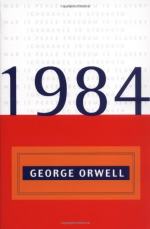|
This section contains 1,371 words (approx. 5 pages at 300 words per page) |

|
Rhyme, Slime, and Crime: an Exploration of the Destructive Side of Rhyme in Orwell's 1984
Summary: The idea of rhyme in language plays two important roles in George Orwell's dystopian novel 1984. First, the negative portrayal of rhyme helps us to understand Orwell's opinion on language--that speech or writing without a purpose or meaning is harmful and dehumanizing because conscious thought, the thing that makes us human, is not necessary in its creation.
The idea of rhyme in language plays two important roles in George Orwell's dystopian novel 1984. First, the negative portrayal of rhyme (or words that sound the same) helps us to understand Orwell's opinion on language--that speech or writing without a purpose or meaning is harmful and dehumanizing because conscious thought, the thing that makes us human, is not necessary in its creation. Second, the control that the necessity of rhyme has on the content of a poem symbolizes the way the Party controls the lives and consciousnesses of the citizens of Oceana--by limiting possible choices. We see this most directly in the language of Newspeak, but also indirectly in the way that all choices made by the characters are calculated and presented by the Party, even rebellion.
Throughout the novel, Orwell shows that meaningless language that simply sounds good takes us away from our humanity by making higher...
|
This section contains 1,371 words (approx. 5 pages at 300 words per page) |

|


